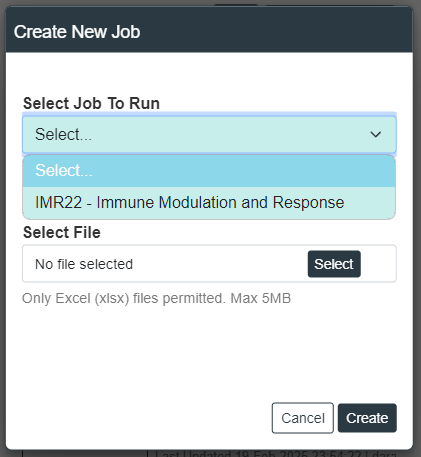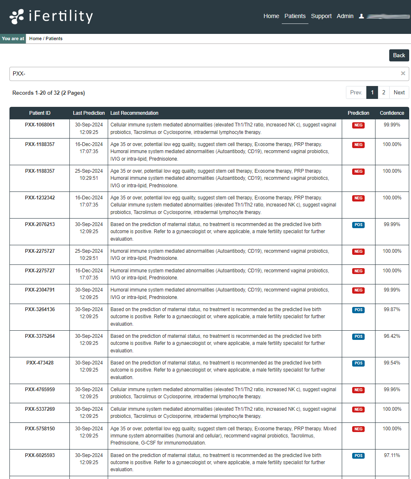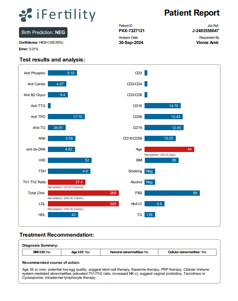Creating Futures, One Birth at a Time
The world’s first AI-driven diagnostic for immune-related recurrent pregnancy loss - now expanding into nanoparticle therapy and RIF immune detection.
The world’s first AI-driven diagnostic for immune-related recurrent pregnancy loss - now expanding into nanoparticle therapy and RIF immune detection.



Our AI-driven diagnostic tool analyzes a broad range of immune, metabolic, and lifestyle factors to assess the risk of immune-related pregnancy loss. By integrating multiple data points, we provide clinicians with a comprehensive, science-backed assessment to guide personalized treatment.
iFertility evaluates key immune system indicators, identifying imbalances linked to recurrent pregnancy loss. These biomarkers assess immune activation, inflammation, and regulatory function, helping to determine whether an underlying immune dysfunction is impacting pregnancy outcomes.
The system also incorporates metabolic and endocrine markers, which influence immune function and reproductive health. By analyzing these factors, we can detect subtle physiological patterns that may contribute to implantation failure and pregnancy loss.
Beyond laboratory data, lifestyle and patient history play a crucial role in reproductive outcomes. iFertility considers factors such as:
This multi-dimensional approach allows iFertility to detect patterns that traditional methods often miss, providing clinicians with a more precise and actionable diagnosis while maintaining patient safety and privacy.




Recurrent pregnancy loss (RPL) affects up to 2% of couples and is increasingly linked to immune dysfunction at the maternal–fetal interface. Current treatments rely on systemic immunosuppression, which offers limited success and poses significant safety risks. Our study introduces a drug-free, placenta-targeted nanoparticle (NP) therapy designed to localize immune modulation precisely where it is needed. The system employs a biodegradable PLGA core with PEG stealth coating, SPIONs for imaging, and placental-homing peptides for targeted delivery. This localized immune-cloaking strategy aims to promote maternal–fetal tolerance while avoiding the systemic side effects of conventional therapies — offering a safer, scalable, and cost-effective pathway to reducing RPL incidence.
Recurrent implantation failure (RIF) remains a major barrier to successful assisted reproduction despite advances in fertility treatment. In this study, we developed a deep learning model (TabNet) to predict live birth outcomes in 2,463 RIF patients using 23 clinical and immunological variables. The model achieved an accuracy of 87.4% and an AUROC of 0.952, identifying key predictors such as age, Th1/Th2 ratio, BMI, anti-TPO, ANA, anti-dsDNA, and anti-TTG antibodies. These findings demonstrate the potential of AI-based multivariable analysis to improve understanding of implantation failure and guide personalised immune-modulation strategies in fertility care.
Recurrent pregnancy loss (RPL) affects up to 5% of women attempting to conceive, with many cases remaining unexplained. In this study, we developed a deep learning model to identify immune-lifestyle patterns associated with RPL using clinical and laboratory data from over 36,000 women across five fertility clinics. The model, based on 22 key biomarkers and lifestyle variables, achieved an AUC of 0.985 and accuracy of 0.946, outperforming traditional methods. By revealing links between immune and lifestyle factors, this research offers a new pathway for early diagnosis and targeted treatment of RPL.
Recurrent pregnancy loss (RPL) is increasingly linked to immune dysfunction at the maternal–fetal interface, yet current systemic immunotherapies lack tissue specificity and pose significant safety risks. In this pre-clinical study, we are developing a PLGA-based nanoparticle platform functionalized with HLA-G, PD-L1, and VAR2CSA to achieve placenta-specific immune modulation. The study evaluates nanoparticle synthesis, ligand conjugation, stability, and their effects on natural killer (NK) and CD8⁺ T-cell activity using in-vitro co-culture models. This work aims to establish a localized, drug-free immune-cloaking therapy that promotes maternal–fetal tolerance while minimizing systemic immunosuppression — advancing a new frontier in reproductive immunotherapy.
This international, multi-centre cohort study aims to validate and refine the predictive performance of the iFertility AI model for immune-mediated reproductive disorders. Partnering with fertility clinics across multiple regions, the study analyses both historical and prospective patient data to evaluate whether clinical decisions and treatment outcomes - particularly in immune-targeted therapies - align with AI-based predictions of live birth potential. By integrating diverse population datasets and real-world clinical variables, this research seeks to confirm the model’s generalisability and strengthen its role as a decision-support tool for reproductive immunology and fertility care.
We are preparing an in-vivo rodent study to evaluate the safety, biodistribution, and immunomodulatory efficacy of the INTACT (Immune-Neutralizing Targeted Cloaking Technology) nanoparticle system. This pre-clinical trial will investigate how placenta-targeted PLGA nanoparticles, functionalized with HLA-G, PD-L1, and VAR2CSA, influence maternal immune tolerance and fetal survival outcomes. Parameters including NK/T-cell activity, cytokine expression, placental uptake, and histopathology will be assessed to establish safety and mechanistic insights. These findings will support translational development toward first-in-human trials, advancing a new class of targeted, drug-free immunotherapies for pregnancy loss.
We are preparing a non-human primate study to evaluate the safety, biodistribution, and immunomodulatory efficacy of the INTACT (Immune-Neutralizing Targeted Cloaking Technology) platform. This translational phase will assess maternal immune tolerance, placental nanoparticle uptake, and fetal viability in a model closely resembling human pregnancy. Findings will guide dose optimization, delivery kinetics, and immune engagement parameters to support readiness for human trials.
Following successful pre-clinical validation, we plan a multi-phase clinical program to assess the safety, efficacy, and long-term outcomes of INTACT nanoparticle therapy in women with immune-mediated recurrent pregnancy loss and implantation failure. The combined Phase I/II/III study will evaluate safety profiles, dosage parameters, and clinical pregnancy outcomes, marking a major step toward introducing targeted, drug-free immunotherapy into reproductive medicine.
We have filed a provisional Australian patent for our AI-driven diagnostic method. This protects our unique approach to analyzing immune and clinical data, securing iFertility’s position as a leader in reproductive immunology AI.
We have filed a provisional Australian patent for our INTACT nanoparticle platform — a breakthrough technology designed to restore immune tolerance at the maternal–fetal interface. The system uses placenta-targeted nanoparticles functionalized with immune-modulating ligands to engage NK and T-cell pathways locally, reducing systemic risk while promoting fetal protection. This filing secures iFertility’s intellectual property in next-generation reproductive immunotherapies.
We are deeply moved by the impact miscarriage and infertility have on women and their families. The journey to parenthood for some can be difficult and challenging.
The fertility industry is experiencing significant growth, driven by increasing demand for advanced reproductive technologies and services. In 2021, venture capitalists invested $345 million — a 35% increase from 2020 — into fertility care startups, reflecting the sector's robust potential.
iFertility welcomes strategic investors and partners who share our vision of transforming reproductive medicine through advanced AI diagnostics and next-generation immunotherapies. Your partnership will accelerate the global rollout of our diagnostic platform and support the clinical advancement of our proprietary INTACT (Immune-Neutralizing Targeted Cloaking Technology) nanoparticle system.
We offer multiple engagement pathways — including early equity participation, clinical trial collaboration, and regional licensing opportunities — each designed to create meaningful impact across the fertility and women’s health sectors. Our diversified pipeline provides investors with near- and long-term value through AI-driven diagnostics and localized immunotherapy development milestones.
Detailed financial models, partnership frameworks, and commercialization timelines are available to qualified investors under confidentiality.
The iFertility team brings together deep expertise in medicine, immunology, biotechnology, and data science. United by a shared purpose, we are building a world-class capability that empowers families worldwide with a safe, accessible, and scientifically validated path to a successful birth.
We truly want to "Create Futures, One Birth at a Time!"
We are actively seeking investors to join us in our journey to make a significant impact to declining birth rates.

Dr. Yousefi brings over 20 years of intensive research in immunology, obstetrics, gynecology, and infertility. He has studied and worked at high-profile universities in Iran, teaching numerous master's and PhD students, and contributing significantly to the field through international seminars, conferences, patents, and over four hundred publications.
Notably, at RC Teb Laboratory, he developed a new method for preparing Autologous Conditioned Serum (ACS), BPT, with significant applications in therapies for osteoarthritis, pregnancy issues, and infertility. His extensive experience provides deep insights into immunology and fertility.
Now, Dr. Yousefi is excited to focus on AI-driven bio data analysis at iFertility, aiming to maximize live birth rates and improve medical services in immunology and infertility.

Vinnie brings over 25 years of technology and implementation experience, with a focus on building cutting-edge AI systems for large organizations, including those in telecommunications, government, and construction.
He holds an Engineering degree with a major in software and a Master's in Project Management. With 8 years of specialized experience in AI development, Vinnie has worked on a variety of successful technology projects.
Vinnie has commited his career and personal funding to join iFertility, as he beleives this initiative is the first time he can contribute to life-changing technology.